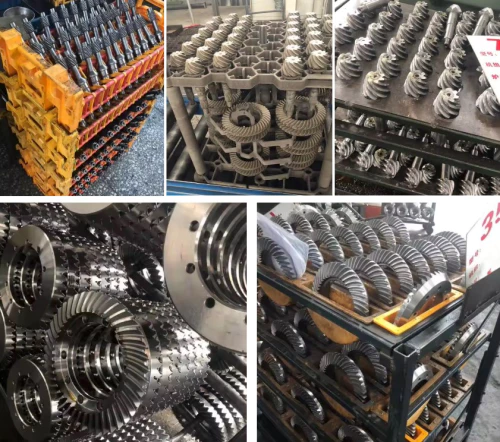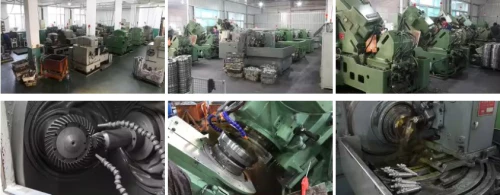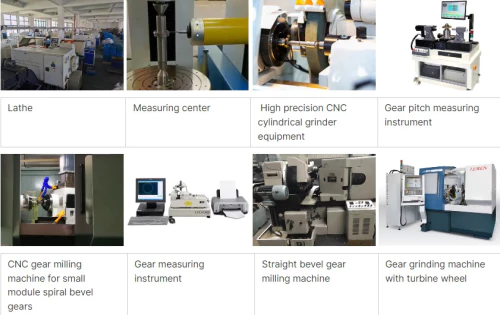How does the choice of lubricants impact the performance of forged bevel gears?
Introduction
Forging bevel gears are a type of bevel gears that are manufactured through the forging process. Forging involves shaping metal through the application of localized compressive forces, typically using a die or hammer. In the case of bevel gears, the forging process is used to form the gear teeth and create the desired gear geometry.
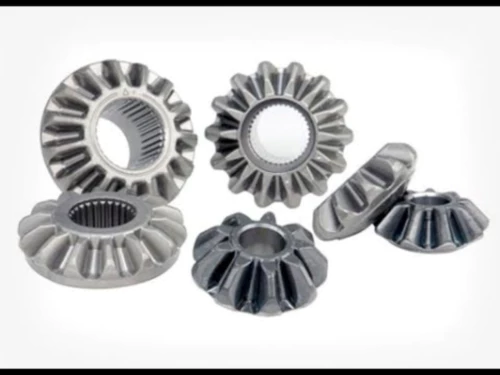
Advantages of Forged Bevel Gears
1. High Strength
Forged bevel gears are known for their high strength, which allows them to handle heavy loads and withstand extreme operating conditions.
2. Improved Fatigue Resistance
The forging process improves the fatigue resistance of bevel gears, making them more durable and long-lasting.
3. Precise Gear Tooth Geometry
Forging allows for the creation of precise gear tooth geometry, resulting in smoother operation and better overall performance.
4. Cost-Effectiveness
Forged bevel gears offer cost-effectiveness due to their ability to be mass-produced and their long service life, reducing the need for frequent replacements.
5. Versatility in Material Selection
Forging allows for the use of a wide range of materials, providing versatility in material selection to meet specific application requirements.
6. Enhanced Structural Integrity
The forging process enhances the structural integrity of bevel gears, making them more reliable and less prone to failure.
7. Tailored Mechanical Properties
Forged bevel gears can have their mechanical properties tailored to meet specific performance requirements, ensuring optimal performance in various applications.
8. Reduced Lead Time
The mass-production capability of the forging process reduces lead time, allowing for faster delivery of bevel gears.
9. Environmental Sustainability
Forging is a sustainable manufacturing process that produces minimal waste and has a lower environmental impact compared to other manufacturing methods.
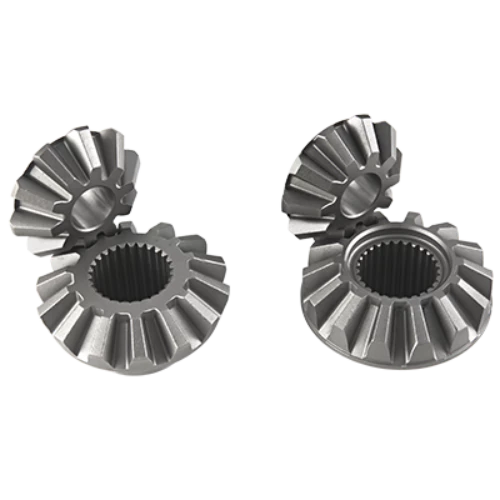
Working Principles of Forged Bevel Gears
Forging bevel gears operate based on the fundamental principles of gear mechanisms. They consist of two intersecting shafts, each with a conically shaped gear (bevel gear) mounted on it. The teeth of the bevel gears are designed to have a specific tooth profile, such as straight, spiral, or hypoid, depending on the application requirements.
When the input shaft rotates, the engagement of the teeth of the bevel gears causes a transfer of rotational motion and torque to the output shaft. The contact between the mating teeth ensures power transmission while maintaining proper alignment and smooth operation.
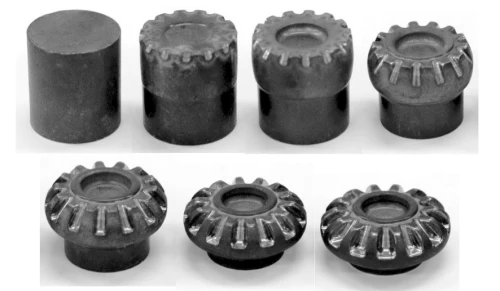
Applications of Forged Bevel Gears
1. Automotive Industry
Forged bevel gears are widely used in the automotive industry for applications such as differential systems and power transmission.
2. Industrial Machinery
Industrial machinery, such as machine tools and heavy equipment, utilize forged bevel gears for efficient power transmission.
3. Aerospace and Defense
The aerospace and defense sector relies on forged bevel gears for critical applications that require high reliability and performance.
4. Renewable Energy
Forged bevel gears play a vital role in renewable energy systems, including wind turbines and solar power systems.
5. Marine and Shipbuilding
Marine and shipbuilding industries use forged bevel gears in propulsion systems and other marine applications.
6. Agricultural Machinery
Agricultural machinery such as tractors and harvesters utilize forged bevel gears for efficient power transmission in demanding conditions.
7. Power Generation
Power generation facilities rely on forged bevel gears to transmit power from turbines or generators to the electrical grid.
8. Robotics and Automation
Forged bevel gears are essential components in robotics and automation systems, enabling precise motion control.
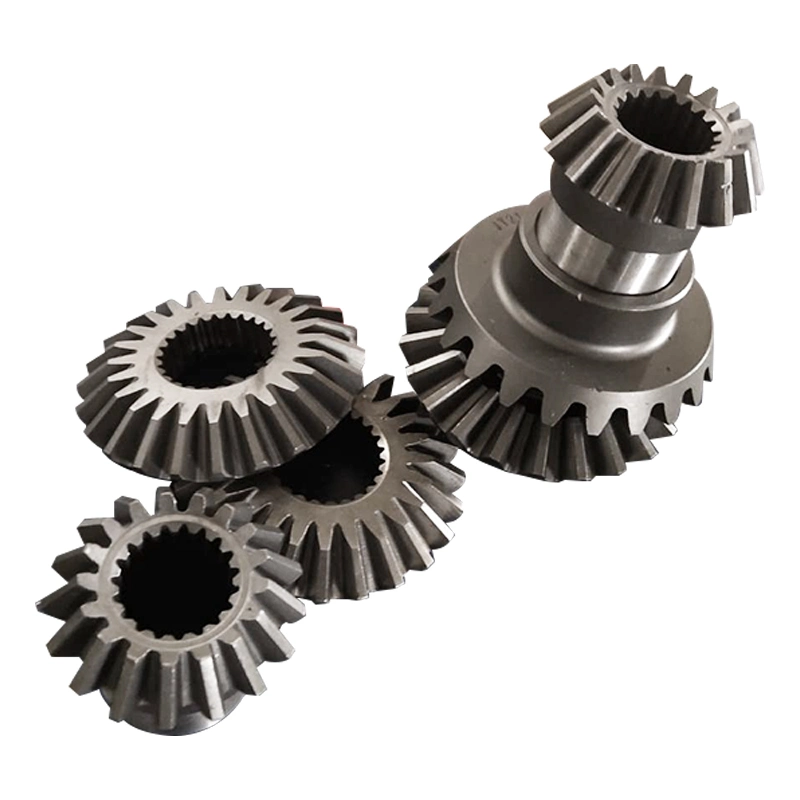
Installation and Maintenance of Forged Bevel Gears
Installation:
1. Proper Alignment: Ensuring proper alignment during installation is crucial for optimal gear performance and longevity.
2. Lubrication: Proper lubrication of the bevel gears is essential to reduce friction and wear, ensuring smooth operation.
3. Mounting Bolts: Securely fastening the bevel gears using appropriate mounting bolts is necessary to prevent loosening during operation.
4. Inspection: Conducting thorough inspections before and after installation helps identify any potential issues or defects that may affect performance.
Maintenance:
1. Lubrication: Regular lubrication of the bevel gears is necessary to maintain optimal performance and prevent premature wear.
2. Cleaning: Keeping the gears clean and free from debris or contaminants helps prevent damage and ensures smooth operation.
3. Inspection: Regular inspections are important to identify any signs of wear, damage, or misalignment that require attention.
4. Replacements: Replacing worn or damaged bevel gears with new ones is essential to maintain optimal performance and prevent failures.
5. Gearbox Maintenance: Proper maintenance of the gearbox, including regular inspections and lubrication, is crucial for overall gear performance.
6. Load Monitoring: Monitoring the applied loads on the bevel gears helps prevent overloading and premature failures.
7. Training and Expertise: Proper training of personnel involved in maintenance ensures correct procedures are followed and potential issues are addressed effectively.
8. Record-Keeping: Maintaining detailed records of maintenance activities and gear performance helps track and analyze any trends or issues.
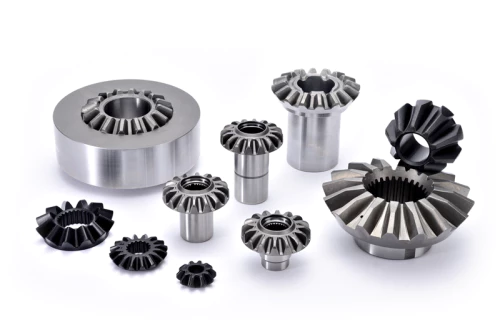
Choosing the Right Forged Bevel Gear
1. Application Requirements
Consider the specific requirements of the application, such as load capacity, speed, and operating conditions.
2. Design and Specifications
Ensure that the design and specifications of the bevel gear align with the intended application and performance expectations.
3. Material Selection
Select the appropriate material for the bevel gear based on factors such as strength, durability, and compatibility with the operating environment.
4. Quality and Reliability
Choose a forged bevel gear from a reputable manufacturer known for producing high-quality and reliable gear products.
5. Load-Carrying Capacity
Determine the required load-carrying capacity of the bevel gear to ensure it can handle the expected loads without failure.
6. Efficiency and Performance
Consider the gear's efficiency and performance characteristics to ensure optimal power transmission and overall system efficiency.
7. Customization and Adaptability
Opt for a manufacturer that offers customization options to tailor the bevel gear to specific application requirements if needed.
8. Cost Considerations
Evaluate the cost-effectiveness of the bevel gear, considering factors such as initial investment, maintenance, and expected longevity.
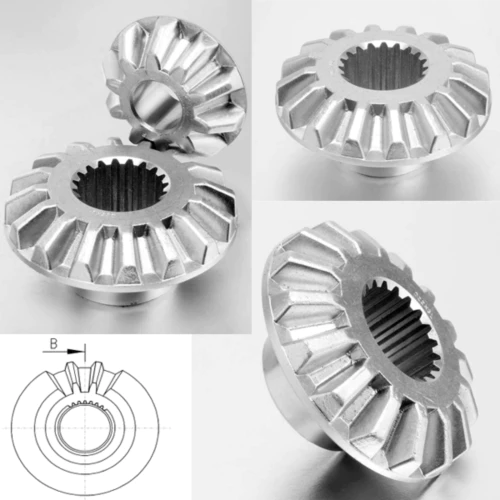
About Shaoxing Chaoli
Shaoxing Chaoli is a professional manufacturer of gears in China. We export our products to countries such as Spain, the Netherlands, the United States, South Korea, Turkey, and Russia. We strive to help customers develop new products and solve technical and quality problems. Our commitment is to meet the needs of users with high-quality products, fair prices, and perfect services.
In addition to forged bevel gears, Shaoxing Chaoli offers a wide range of other gear products, including worm gears, spiral bevel gears, helical gears, spur gears, plastic gears, and metric gear racks. We welcome inquiries for customized products.
Shaoxing Chaoli has hundreds of employees, including many engineers, and has fixed assets of 20 million yuan with an annual output value of 50 million yuan. We have a complete set of strict quality management systems, equipped with precision measuring instruments and production monitoring systems to ensure the quality and competitiveness of our products.
We invite friends from the business community to cooperate with us and create brilliance together.
